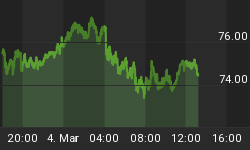As the economic indicators turn down and election year politics heats up, the calls from politicians for more government intervention and enhanced economic stimulus are becoming more strident. Last week, with the onset of the general presidential campaign, and with increased attention on the economy shown by the Bush administration, I could not help but think that something big was in the air. And by big, I mean the kind of massive new Federal spending initiatives that we haven't seen since the Great Society of the 1960's.
In particular, Fed Chairman Ben Bernanke's June 4th address to the rain-soaked Harvard graduating students provided much food for thought. In it, the Chairman spent a great deal of time discussing both the burdens imposed on the economy by high energy costs and dependence on foreign oil and the positive economic effects offered by more robust fiscal stimuli (which is economic speak for increasing government spending without increasing taxes). It occurred to me that Bernanke was perhaps laying the groundwork for the next great Federal spending campaign. As has been the case in the past, Federal spending is touted as a means to fix our nation's social and structural problems, while simultaneously igniting economic growth. Although this is a mix that no politician can resist, all it promises the citizenry is botched policy and hyperinflation.
It appears that, despite government statistics showing sluggish growth, our economy is heading into a recession, perhaps severe. Depression is also a possibility. While the government and financial elites are only grudgingly coming to this conclusion, the rank and file has accepted the reality and is demanding solutions. The most politically "attractive" way out appears to be to lower interest rates still further and encourage more spending both on a personal and Federal level. However, big expansions of government spending may encounter resistance, and as a result would need to be carefully packaged. Spending on alternative energy just may fit the bill.
Although few deny that the development of alternative fuel sources would be a good thing for this country and the world, it is wrongheaded to believe that government-directed spending can bring about meaningful change on that front. Government spending involves three major problems: inefficiency, political bias and major cost over-runs.
Almost without exception, the executives within government (bureaucrats) are unskilled in business. Although many are academically gifted, few have experience, or interest, in balancing investment and financial risk. History has shown time and again that government spending economic development is notoriously wasteful, and leads to enormous taxpayer liabilities and unintended consequences. For example, the vast government spending over decades to reduce U.S. poverty has failed lamentably. Some would argue that has even contributed to the institutionalization of poverty. Similarly, increased government spending on education has led to steady declines in educational quality.
By promoting and sponsoring inefficient solutions, government spending can push out entrepreneurs, who might otherwise revitalize an industry. Indeed, it is government spending that has almost single handedly transformed our once great "producer" nation into a "consumer" nation. Once established, government spending programs never disappear. It is certain that any new bureaucracy created to develop alternative energy will persist indefinitely, whether or not it succeeds at all.
What history has clearly shown is that government "non-spending", in the form of reduced taxes and regulation that has proved the greatest boost to enterprise.
In truth, politicians are much more interested in the spending than they are in the results. In distributing taxpayer money politicians can play the part of Santa Claus, especially if they don't raise taxes to pay for the goodies. In so doing, they are reading directly from the textbooks of John Maynard Keynes, who somehow gained academic transcendence by claiming the government can jump start the economy by simply printing money and spending it.
Of course, there is a price to be paid for such deficit spending, a little nuisance called inflation. When the government prints money to meet its obligations, it debases the currency. In effect, it levies an inflation tax to make up the difference. If the authorities can disguise the inflation in the short term, then so much the better for them. Not so much for the rest of us.
No one should be fooled by all this talk of a government led effort that will finally wean us from our dependence on foreign oil, rid the planet of its environmental woes, and supercharge the economy in the process. Instead, it's simply a recipe for more bureaucracy and higher inflation. Have we all forgotten how the "Guns and Butter" of the 1960's led to the stagflation of the 1970's? Our politicians are banking on it.
For a more in depth analysis of our financial problems and the inherent dangers they pose for the U.S. economy and U.S. dollar denominated investments, read Peter Schiff's book "Crash Proof: How to Profit from the Coming Economic Collapse." Click here to order a copy today.
More importantly, don't wait for reality to set in. Protect your wealth and preserve your purchasing power before it's too late. Discover the best way to buy gold at www.goldyoucanfold.com, download our free research report on the powerful case for investing in foreign equities available at www.researchreportone.com, and subscribe to our free, on-line investment newsletter at http://www.europac.net/newsletter/newsletter.asp.















